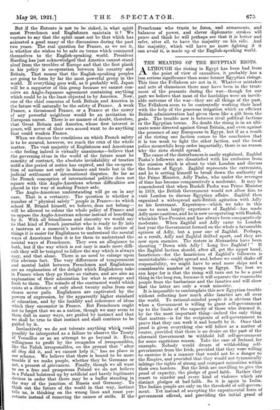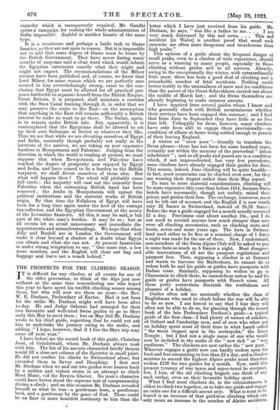- THE MEANING OF THE EGYPTIAN RIO.
A LTHOUGH the rioting in Egypt has been bad from III the point of view of casualties, it probably has a less serious significance than some former Egyptian risings. This time the Tellaheen are not in it. Whatever mistakes and acts of 'clumsiness there may have been in the treat- ment of the peasants during the war—though for our part we believe that most of the hardships were an inevit- with the help Of the generous irrigation which an efficient British administration had given them like a gift from the gods. The trouble now is between rival political factions in the Egyptian towns. No doubt the rising is in an ulti- mate sense directed against Great Britain, and even against the presence of any Europeans in Egypt, but if as a result of the rioting one faction comes to the conclusion that it is too weak to fight the other faction, and the local police meanwhile keep order impartially, there is no reason why the riots should spread. The cause of the disturbances is easily explained. Zaghlul Pasha's followers are dissatisfied with his exclusion from the mission which is about to visit London and discuss the future of Egypt. Zaghlul represents the extremists, and he is setting himself to break down the authority of the Prime "Minister, Adly Pasha, who under the revenges Of time has become comparatively a moderate. It may be remembered that when Rushdi Pasha was Prime Minister in '19,19,, the British Government would not allow him to visit London to discuss Egyptian affairs. Zaghlul then organized a widespread anti-British agitation with Adly as his lieutenant. Experience—which we take in this case to mean largely experience of Zaghlul—has made Adly more cautious, and he is now co-operating with Rushdi, who is his Vice-Premier, and has always been comparatively moderate. When Zaghlul and Adly came to London last year the Government formed on the whole a favourable opinion of Adly, but a poor one of Zaghlul. Perhaps, as a result, Adly and Zaghlul drifted apart, and they are now open enemies. The rioters in Alexandria have been shouting "Down with Adly ! Long live Zaghlul " If the Zaghlul faction should, after all, get the upper hand, fanaticism—for the fanaticism of Zaghlul's followers is unmistakable—might spread and, before we could shake off responsibility, we might have to send more ships and a considerable number of troops to Egypt. The best we can hope for is that the rising will turn out to be a good thing in-the long run, because, it will separate the reasonable people from the barbarians and the fanatics and will show that the latter are only a weak minority. It is impossible to contemplate this new Egyptian trouble without reflecting how much alike fanatics are all over the world. To rational-minded people it is obvious that when a Government is willing to grant self-government up to the limits of the capacity of those who demand it, by far the most important thing—indeed the only thing that matters—is for the recipients of self-government to prove that they can work it and benefit by it. Once that proof is given everything else will follow as a matter of course, provided that there is no desire on -the part of the aforesaid Government to withhold full self-government for some capricious reason. Take the case of Ireland, for example. Nobody would dream of withholding self- government from the Irish, provided that they were willing to 'exercise it in a manner that would not be a danger to the Empire, and provided that they would not tyrannically infringe the rights of strong and compact minorities within their own borders. But the Irish are unwilling to give the proof of capacity, the pledge of good faith. Rather they resort to murder and every kind of violence which are distinct pledges of bad faith. So it is again in India. The Indian people are only on the threshold of self-govern- ment. Yet instead of accepting the experimental form of government offered, and providing the initial proof of capacity which is transparently required, Mr. Gandhi opens a campaign for making the whole administration of India impossible. Zaghlul is another fanatic of the same type. It is a wearisome and perhaps a futile task to blame fanatics, as they are not open to reason. But it is impossible not to add that some degree of blame must be borne by the British Government. They have never during many months of suspense said a clear word which would inform the Egyptian extremists exactly what they might and might not expect. The recommendations of the Milner mission have been published and, of course, we know that Lord Milner, for some reason which we are perfectly sure seemed to him overwhelmingly strong, came to the con- clusion that Egypt must be allowed for all practical pur- poses forthwith to separate herself from the British Empire. Great Britain, it is proposed, shall maintain a corridor with the Suez Canal running through it, in order that we may preserve the route to the East—on the assumption that anything in the East will remain sufficiently a British interest to make us want to go there. The Sudan, again, is to remain under British rule. But, apparently, it is contemplated that the Egyptians shall be allowed to set up their own Sultanate or Soviet or whatever they like. Thus we see that while we are divesting ourselves of Egypt and India, nominally though probably not really in the interests of Ile natives, we are taking on new expensive burdens in Mesopotamia and Palestine. Judging from the direction in which the world is tending at present, we must suppose that when Mesopotamia and Palestine have reached the degree of prosperity now enjoyed by Egypt and India, and have ceased to be a burden to the British taxpayer, we shall divest ourselves of them also. But what will happen then ? The wheel will piobably come full circle ; the majority will cast out the minority from Palestine when the restraining British hand has been removed ; the Arabs in Mesopotamia will uproot the political institutions and the material works of British origin. By that time the Fellaheen of Egypt will have been for a long time again under the heel of the corrupt tax-collector, and the Egyptian Government at the mercy of the Levantine financier. All this, it may be said, is but part of the white man's burden. It may be so but at all events let us avoid unnecessary and immediate dis- appointments and misunderstandings. We hope that when Adly and Rushdi are in London the Government will make it clear beyond a shadow of a doubt what Egypt can obtain and what she can not. At present fanaticism is under strong temptation to say, "One more riot, a few more murders, and the English will clear out bag and baggage and leave not a wrack behind."



































 Previous page
Previous page